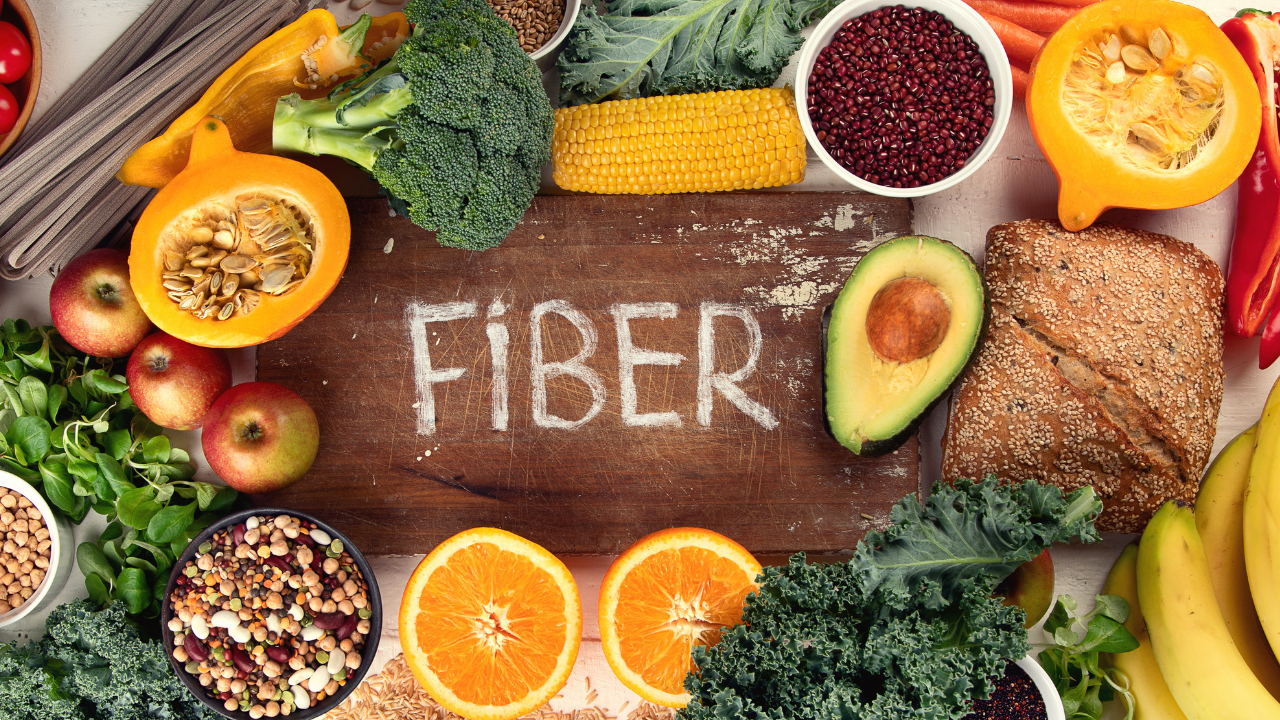Did you know that over 90% of adults in the United States do not consume enough fiber in their daily diet? Meanwhile, a recent study has found that 7 out of 10 Indians do not consume enough fiber in their daily diet.
Also, a qualitative study on the evolving food choices of the urban middle class noted that the Urban Indian population is transitioning from diets high in fiber to diets high in sugar, fats, and animal-source foods.
This unhealthy transition results in an unprecedented rise in overweight and obesity has been accompanied by significant increases in chronic degenerative diseases, including diabetes, cardiovascular disease, respiratory illness, and certain types of cancer.
That's right, despite the crucial role of dietary fibre in maintaining our overall health, fiber deficiency is a widespread issue that often goes unnoticed. Fear not, we got you covered! In this article, we will uncover the top 10 signs of fiber deficiency and empower you to take control of your well-being.
You might wonder, what is fiber, and why is it so important? Fiber is a type of carbohydrate found in plant-based foods that cannot be digested by our bodies. Instead, it passes through our digestive system intact, providing various benefits along the way.
From supporting regular bowel movements to promoting heart health and aiding weight management, fiber is essential in keeping us healthy and feeling our best. A well-balanced whole food plant-based diet - one of the healthiest diets out there - is especially so, because of how rich it is in dietary fibre.
So if you've been experiencing any strange symptoms or just want to ensure you're getting enough fiber in your diet, keep reading as we explore the top 10 signs of fiber deficiency and how you can address them.
Key Takeaways
- Fiber deficiency is a widespread issue, with over 90% of US adults and 7 out of 10 urban Indians not consuming enough fiber daily.
- Common signs of fiber deficiency include constipation, weight gain, unstable blood sugar levels, and bloating.
- Increasing fiber intake can alleviate these symptoms and reduce the risk of diseases such as heart disease and type 2 diabetes.
- Following a high-fiber diet such as the whole food plant-based diet ensures that you include a wide variety of fruits, vegetables, whole grains, legumes, nuts, and seeds. This is crucial for maintaining optimal health.
Top 10 signs of fiber deficiency:
There are several tell-tale signs that pop up when you don't eat enough fiber. From feeling constipated to wanting to snack more frequently or overeating, to unstable blood sugar levels.
Increasing your intake of high-fiber foods can significantly improve these symptoms and reduce the risk of various diseases. The recommended daily intake for adults is around 25 grams of fiber for women and 38 grams for men.
Following a high-fiber diet that includes a wide variety of fruits, vegetables, whole grains, legumes, nuts, and seeds, can increase your fiber intake and support a healthy digestive system while reducing the risk of heart disease and other chronic conditions associated with low-fiber diets.
Constipation
Feeling backed up? It's time to increase your fiber intake. Constipation is one of the top signs of fiber deficiency, and it can be quite uncomfortable.
When you don't consume enough fiber, your stool becomes hard and difficult to pass, leading to infrequent bowel movements. Fiber helps add bulk to your stool and promotes regular bowel movements. Insufficient intake of fibre may result in your stool becoming hard and difficult to pass, leading to constipation. Not getting enough fiber in your diet can also affect your weight. High-fiber foods tend to be more filling and can help control hunger cravings.
Increasing your fiber intake can help soften your stool and promote regularity.
Include high-fiber foods like fruits, vegetables, whole grains, and legumes in your diet. These foods are rich in fiber and provide essential nutrients that support overall health.
Following a high-fiber diet such as the whole foodplant-based diet that includes a wide variety of fruits, vegetables, whole grains, legumes, nuts, and seeds helps you get your essential dietary fibre and other essential nutrients.
In addition to increasing your fiber intake through a whole food plant-based diet, ensure you drink plenty of water throughout the day. Fiber needs water to work effectively in your body. Without enough hydration, the insoluble fibers in food can contribute to constipation rather than relieve it.
By addressing constipation through increased fiber consumption, you'll take a proactive step toward preventing other potential complications associated with long-term constipation, such as hemorrhoids or anal fissures.
Don't ignore the signs - pay attention to any changes in bowel habits or discomfort that may indicate a lack of dietary fiber. Your digestive system will thank you for it!
Irregular bowel movements
One of the main symptoms of fiber deficiency is infrequent or irregular bowel movements. If you are going days without a bowel movement or experiencing inconsistent patterns, it may be due to a lack of dietary fiber.
Addressing irregular bowel movements can be achieved by increasing fiber intake and staying hydrated. Irregular bowel movements are often a sign of fiber deficiency, as a lack of fiber in the diet can lead to constipation and difficulty passing stool.
Fiber acts like a sponge in the digestive system, absorbing water and adding bulk to the stool, making it easier to pass. By increasing your fiber intake, you can help regulate your bowel movements and achieve more regularity.
A low-fiber diet can slow down digestion and make it harder for waste to move through the intestines. Increasing your fiber intake by incorporating more fruits, vegetables, whole grains, and legumes into your diet can help promote regularity.
It's essential not only to increase your fiber intake but also to stay hydrated. Fiber works best when there is enough water in the digestive system since it absorbs water and adds bulk to the stool. Without proper hydration, increasing fiber intake alone may not provide relief from irregular bowel movements.
Ensure to drink adequate water throughout the day to support healthy digestion and prevent dehydration.
Addressing irregular bowel movements requires increasing your fiber intake and staying hydrated. Irregular bowel movements are often a symptom of fiber deficiency caused by a lack of dietary fiber in the diet.
Bloating
Combat bloating by incorporating more fiber-rich foods into your diet and staying hydrated to promote a healthy digestive system. Bloating is a common symptom of fiber deficiency, as it can disrupt the normal functioning of your digestive system.
When you don't consume enough fiber, your body struggles to break down food properly, leading to gas and bloating. By increasing your fiber intake, you can help regulate bowel movements and prevent uncomfortable bloating.
One possible cause of bloating related to fiber deficiency is severe constipation. When there isn't enough fiber in your diet, it can lead to infrequent or difficult bowel movements. This can result in a build-up of waste in the intestines, causing bloating and discomfort.
By including more high-fiber foods like fruits, vegetables, whole grains, and legumes in your meals, you can promote regularity and alleviate bloating caused by constipation.
Occasional constipation may also be a sign of iron deficiency linked to low levels of dietary fiber intake. Iron plays a vital role in maintaining healthy digestion and preventing constipation.
If you're experiencing frequent bouts of constipation and bloating, it's essential to address both issues by increasing your intake of iron-rich foods such as dates, beans, spinach, and fortified cereals such as crunchy granola and flaxseed B12 laddu.
Remember that staying well-hydrated is equally important for good digestive health, as water helps soften stool making it easier to pass through the intestines.
By understanding these common symptoms associated with fiber deficiency like bloating, and addressing them through simple dietary changes such as incorporating more fiber-rich foods into your meals and ensuring proper hydration levels are maintained, you can significantly improve your overall digestive health.
So next time you experience uncomfortable bloating or irregular bowel movements, consider adding more fibrous foods into your daily routine.
Weight gain
When you don't consume enough fiber, it can lead to increased hunger and cravings for unhealthy, calorie-dense foods. This often results in overeating and, ultimately, weight gain.
Adding more fiber to your diet is like unleashing a weight loss superhero that can help you shed pounds effortlessly. One of the top 10 signs of fiber deficiency is weight gain.
Fiber plays a crucial role in weight management because it helps you feel fuller for longer. It adds bulk to your meals, slowing digestion and keeping you satisfied for hours after eating. Without enough fiber, you may find yourself constantly reaching for snacks or experiencing frequent hunger pangs. These extra calories can quickly add up and contribute to unwanted weight gain.
In addition to promoting satiety, fiber also helps regulate blood sugar levels. When your blood sugar spikes after a high-carbohydrate meal, it can trigger insulin release and promote fat storage. Including more fiber in your diet can stabilize blood glucose levels and prevent these fluctuations from contributing to weight gain.
It's also essential to note that carbohydrate is not the enemy. You can avoid such blood sugar spikes and other adverse health effects by eating healthier complex carbohydrates like whole plant food sources such as fruits, vegetables, whole grains, lentils, legumes, nuts, and seeds.
To combat this sign of fiber deficiency and support healthy weight management, aim to include a variety of high-fiber foods in your daily meals. Gradually increase your intake to allow your body time to adjust.
High cholesterol levels
Fiber deficiency can contribute to high cholesterol levels, a major risk factor for heart disease. Boost your heart health and lower cholesterol levels by incorporating more high-fiber foods into your diet. By increasing your intake of fiber-rich foods, you can help reduce the absorption of cholesterol in your body and improve your overall cardiovascular health.
Here are four high-fiber foods that you can incorporate into your diet to help lower your cholesterol levels:
-
Oats: Start your day with a bowl of oatmeal or add oats to smoothies, baked goods, breakfast jars or plant-based curds. Oats are rich in soluble fiber, which helps to reduce LDL (bad) cholesterol levels.
-
Beans and Legumes: Include black beans, lentils, chickpeas, and kidney beans in soups, salads, or as a side dish. These legumes are high in fiber and contain plant compounds that can lower cholesterol levels.
-
Whole Grains: Swap refined grains like white rice, maida and bread for whole grains such as quinoa, brown rice, whole wheat bread, or whole grain rotis. Whole grains are packed with fiber and other nutrients that can help regulate cholesterol levels.
-
Fruits and Vegetables: Incorporate a variety of fruits and vegetables into your meals and snacks. They are rich in fiber and provide antioxidants that promote heart health.
By including these high-fiber foods in your daily meals, you can support healthy cholesterol levels and reduce the risk of heart disease. Remember to gradually increase the amount of fiber in your diet to prevent digestive discomfort.
Aim for at least 25-30 grams of fiber daily from a combination of fruits, vegetables, whole grains, legumes, nuts, and seeds.
Incorporating a high-fiber diet doesn't have to be complicated or bland. Experiment with different recipes that include these high-fiber foods; add steamed or baked chickpeas to salads, make a fiber-rich smoothie with berries and oats, or enjoy a side of vegetables sautéed in nut butters alongside your main dish.
With a bit of creativity and planning, you can easily increase your fiber intake and improve your heart health. So start today and reap the benefits of a high-fiber diet!
Blood sugar fluctuations
Are you tired of experiencing wild fluctuations in your blood sugar levels? One possible reason for this could be a deficiency of fiber in your diet. Fiber plays a crucial role in regulating blood glucose levels, as it slows down the absorption of glucose and helps maintain stable sugar levels.
When you don't consume enough fiber, your blood sugar can spike after meals and crash shortly afterward, leading to those frustrating fluctuations.
One of the signs that indicate a deficiency of fiber is frequent spikes and crashes in blood sugar levels throughout the day. This can leave you feeling fatigued, irritable, and constantly hungry. Incorporating more fiber-rich foods, such as fruits, vegetables, whole grains, and legumes, can help stabilize your blood glucose levels and prevent these fluctuations.
If you're experiencing frequent blood sugar fluctuations or struggling with weight management issues, it might be worth considering if you're getting enough fiber in your diet. A deficiency of fiber leads to unstable blood glucose levels.
By incorporating more high-fiber foods into your meals and snacks, you can help keep your blood sugar levels stable throughout the day while enjoying numerous other health benefits associated with adequate dietary fiber intake.
Low energy levels
Are you feeling like a drained battery, constantly running on low energy? It could be because your body lacks the fuel it needs to stay powered up - fiber! Low energy levels are among the top 10 signs of fiber deficiency; addressing this issue is essential for overall well-being.
Fiber plays a crucial role in providing sustained energy throughout the day by slowing down digestion and regulating blood sugar levels. When you don't consume enough fiber, your body may experience frequent crashes in energy levels. This is because fiber helps slow down glucose absorption into the bloodstream, preventing sudden spikes and crashes in blood sugar.
Without enough fiber, your blood sugar can fluctuate rapidly, leading to feelings of fatigue and sluggishness. Incorporating more high-fiber foods in your diet, such as whole grains, fruits, vegetables, and legumes, can help stabilize your energy levels throughout the day.
Furthermore, a lack of fiber can also contribute to poor gut health, affecting your energy levels. Fiber acts as a prebiotic that feeds beneficial bacteria in your gut. These bacteria are vital in breaking down food and producing essential nutrients contributing to overall health and vitality.
When you have insufficient fiber intake, these beneficial bacteria may not receive enough nourishment, leading to imbalances in gut flora and decreased energy production.
Low energy levels can indicate you're not getting enough fiber in your diet. Incorporating more high-fiber foods into your meals and snacks by adopting a fiber-rich whole food plant-based diet can support stable blood sugar levels and improve gut health.
Remember to aim for at least 25-30 grams of fiber per day for optimal well-being and sustained energy throughout the day. Take care of yourself by giving your body the fuel it needs and increase your fiber intake today!
Poor skin health
Now that we've discussed the impact of fiber deficiency on low energy levels, let's shift our focus to another critical aspect affected by lack of fiber in your diet: poor skin health. Yes, you heard it right! Your skin health could be suffering due to inadequate fiber intake.
But how exactly does fiber deficiency contribute to poor skin health? Let's explore.
- Dryness: Fiber plays a crucial role in maintaining hydration levels within your body. When you don't consume enough fiber, your body may struggle to retain moisture, leading to dry and dehydrated skin.
- Acne: Did you know that a healthy gut is essential for clear and radiant skin? Fiber acts as a prebiotic, nourishing the beneficial bacteria in your gut. These friendly bacteria help regulate inflammation and hormone levels, which can directly impact acne development.
- Inflammation: A diet lacking in fiber can promote inflammation within the body. Chronic inflammation has been linked to various skin conditions, such as eczema, psoriasis, and rosacea.
- Detoxification: Fiber aids in proper digestion and elimination of waste products from the body. Without enough fiber, toxins can accumulate within your system, affecting overall skin health.
- Premature aging: The antioxidants found in high-fiber foods help protect against free radicals that damage collagen and elastin fibers in the skin. Insufficient intake of these antioxidants may contribute to premature aging signs like wrinkles and sagging skin.
To maintain optimal skin health, it's essential to ensure an adequate dietary fiber intake through various plant-based foods such as fruits, vegetables, whole grains, legumes, nuts, and seeds.
Remember that improving your diet is just one step towards better overall well-being; consulting with a healthcare professional or registered dietitian or booking an online consultation with Dr. Achyuthan Eswar can provide personalized guidance tailored to your specific needs.
So pay attention to the importance of fiber in your diet, not only for the sake of your digestive system but also for the health and appearance of your skin. Start incorporating fiber-rich foods into your meals today by embracing a whole food plant-based diet and watch as your skin starts to glow with vitality!
Increased risk of certain diseases
One major consequence of not consuming enough fiber is an increased vulnerability to developing certain diseases. Fiber is crucial in maintaining a healthy digestive tract and preventing various illnesses.
Without an adequate fiber intake, the digestive system may struggle to function properly, leading to an increased risk of conditions such as constipation, diverticulitis, and even colorectal cancer. Therefore, adults must ensure they consume enough fiber-rich foods in their daily diet.
Soluble fiber, found in foods like oats, beans, and fruits, has been shown to have numerous health benefits. It helps regulate blood sugar levels and lowers cholesterol levels by binding with bile acids in the gut. By doing so, soluble fiber reduces cholesterol absorption into the bloodstream and promotes its elimination from the body.
Additionally, soluble fiber aids in maintaining a healthy weight as it slows digestion and provides a feeling of fullness after meals. This can prevent overeating and promote weight management.
Incorporating sources of fiber into your daily diet is relatively simple and can significantly improve your overall health. The recommended daily intake for adults is around 25 grams per day for women and 38 grams per day for men.
Good sources of fiber include whole grains like brown rice and quinoa, vegetables such as broccoli and Brussels sprouts, legumes like lentils and chickpeas, and nuts and seeds.
By embracing a whole food plant-based diet and having these fibrous foods in your meals regularly, you can reduce your risk of developing certain diseases while promoting optimal digestive health.
Difficulty maintaining a healthy weight
Inadequate fiber consumption can pose challenges in maintaining a healthy weight due to its role in regulating digestion and promoting a sense of fullness after meals. Fiber deficiency often leads to difficulty maintaining a healthy weight because foods high in fiber tend to be lower in calories and more filling, which can help prevent overeating.
When you don't consume enough fiber, it's easier to indulge in calorie-dense foods that lack the satiety factor, leading to weight gain.
One of the top 10 signs of fiber deficiency is struggling with weight management. Without enough fiber, you may struggle to control your appetite and resist unhealthy food cravings. This can result in consuming excess calories from sugary snacks or processed foods that are low in nutrient content but high in empty calories.
By following a whole food plant-based diet and increasing your daily intake of fiber-rich foods such as fruits, vegetables, whole grains, legumes, and nuts, you can feel fuller for more extended periods and reduce the chances of overeating.
Try incorporating more fiber into your daily meals and snacks to maintain a healthy weight and combat difficulties associated with fiber deficiency. Aim for at least 25-30 grams of fiber daily by including various high-fiber foods like broccoli, avocados, chia seeds, lentils, and whole grains.
Additionally, drinking plenty of water can help soften the fiber and aid digestion. Remember that achieving a healthy weight is not just about counting calories; it's also about nourishing your body with nutrient-dense foods that provide satiety and support overall well-being.
By addressing the issue of insufficient fiber intake through conscious dietary choices such as a whole food plant-based diet, you can improve your chances of maintaining a healthy weight.
How to increase fiber consumption through diet?
If you're looking to increase your fiber intake, one effective way is to eat more whole plant food and move towards a whole food plant based (WFPB) diet. This diet emphasizes consuming whole plant foods such as fruits, vegetables, whole grains, legumes, nuts, and seeds.
These foods are naturally high in fiber and can help you meet your daily recommended intake. Incorporating more WFPB meals into your diet can be an easy and practical way to ensure you're getting enough fiber for optimal health.
Whole Food Plant-Based Diet
A key aspect of maintaining a healthy whole food plant-based diet is ensuring an adequate fiber intake. Fiber plays a crucial role in our digestive health and has numerous benefits for our overall well-being. If you're not getting enough fiber in your diet, you may be at risk of developing fiber deficiency, leading to various health issues.
Here are some essential points to consider when it comes to fiber deficiency and how to address it through a whole food plant-based diet:
- Variety of fruits and vegetables: Consuming a wide range of fruits and vegetables ensures that you get different types of fiber essential for optimal gut health.
- Whole grains: Incorporating whole grains like quinoa, brown rice, oats, and whole wheat into your meals provides a good source of dietary fiber.
- Legumes: Including legumes such as lentils, chickpeas, black beans, and kidney beans in your diet not only adds protein but also boosts your fiber intake.
- Nuts and seeds: Snacking on nuts and seeds like almonds, chia seeds, flaxseeds, and walnuts can increase your daily fiber consumption.
Additionally, enhance your progress toward a healthier whole food plant-based lifestyle, explore Sampoorna Ahara's list of daily essentials and Dr. Michael Greger's Daily Dozen Checklist. These resources offer valuable information to further enhance your journey towards a healthier whole food plant-based lifestyle.
By incorporating these foods into your whole food plant-based diet, you can ensure that you meet your body's fiber needs and lead a healthy life. Remember to drink plenty of water throughout the day; proper hydration is essential for effective digestion.
Frequently Asked Questions
What are the long-term health risks associated with a fiber deficiency?
Not getting enough fiber in your diet can lead to long-term health risks. These include an increased risk of heart disease, stroke, type 2 diabetes, obesity, and certain types of cancer. It's important to prioritize fiber-rich foods and follow a well-balanced whole food plant-based diet for optimal health.
Can a fiber deficiency affect mental health and cognitive function?
Yes, a fiber deficiency can affect mental health and cognitive function. Studies have shown that low fiber intake is associated with increased risk of depression and impaired cognitive function. So make sure to include enough fiber in your diet by following a well-balanced whole food plant-based diet that benefits both your physical and mental well-being!
Are there any specific age groups or populations that are more prone to fiber deficiency?
There are no specific age groups or populations that are more prone to fiber deficiency. However, certain factors such as a poor diet high in processed foods and low intake of fruits and vegetables can increase the risk for fiber deficiency.
Can a fiber deficiency lead to nutrient deficiencies?
Yes, a fiber deficiency can lead to nutrient deficiencies. In fact, research shows that inadequate fiber intake is associated with lower intakes of important nutrients like vitamins A, C, and E. So make sure to include plenty of fiber-rich foods in your diet!
Are there any alternative sources of fiber for individuals with dietary restrictions?
Yes, there are alternative sources of fiber for individuals with dietary restrictions. Some options include fruits, chia seeds, flaxseeds, pumpkin seeds, psyllium husk, and vegetables like broccoli and Brussels sprouts. We highly recommend for you to follow a well-balanced whole food plant-based diet can help you eat in abundance and still maintain a healthy life. Additionally, you can book an online consultation with Dr. Achyuthan Eswar for dietary and nutritional guidance.
Conclusion
In conclusion, it's evident that fiber deficiency can profoundly impact your overall health and well-being. Like tree branches reaching out for sunlight, our bodies need fiber to thrive and function optimally. Without enough fiber in our diets, we risk experiencing the sneaky signs of deficiency that often go unnoticed.
Imagine your body as a beautiful garden flourishing with vibrant flowers and lush greenery. Fiber is like the soil that nourishes and supports this garden, providing the essential nutrients for growth and vitality.
When we neglect our fiber intake, it's like depriving our garden of water and watching it wither away.
But fear not! You can take simple steps to increase your fiber intake and restore balance to your body.
By incorporating more fruits, vegetables, whole grains, legumes, and nuts into your daily meals and switching to a whole food plant-based diet, you can replenish your body's nutrient supply and reap the benefits of a well-balanced diet.
Start making small changes today and kick-start your journey towards a fiber-rich whole food plant-based diet to ensure you get enough fiber and all essential nutrients in your meals. And your body will thank you for it!
Next Steps
Congratulations! You have learned the importance of fiber in your diet and the health issues that comes along if you are fiber deficient. Looking to eat a high-fiber healthy diet? We can help with additional tools for you to switch toward a whole food plant-based diet.
-
- Book an online consultation with Dr. Achyuthan Eswar for a personalized medical consultation to prevent, treat and better manage lifestyle diseases through diet and lifestyle.
- Learn to cook delicious whole food plant based goodies and sign up for courses on health and wellness from the comfort of you home. Join our online courses from anywhere in the world.
- Get daily essentials to cook healthy meals at home.
- Stock up on delicious sweets and snacks that are sugar/jaggery-free, oil-free, maida-free and plant-based - Available Pan-India.












